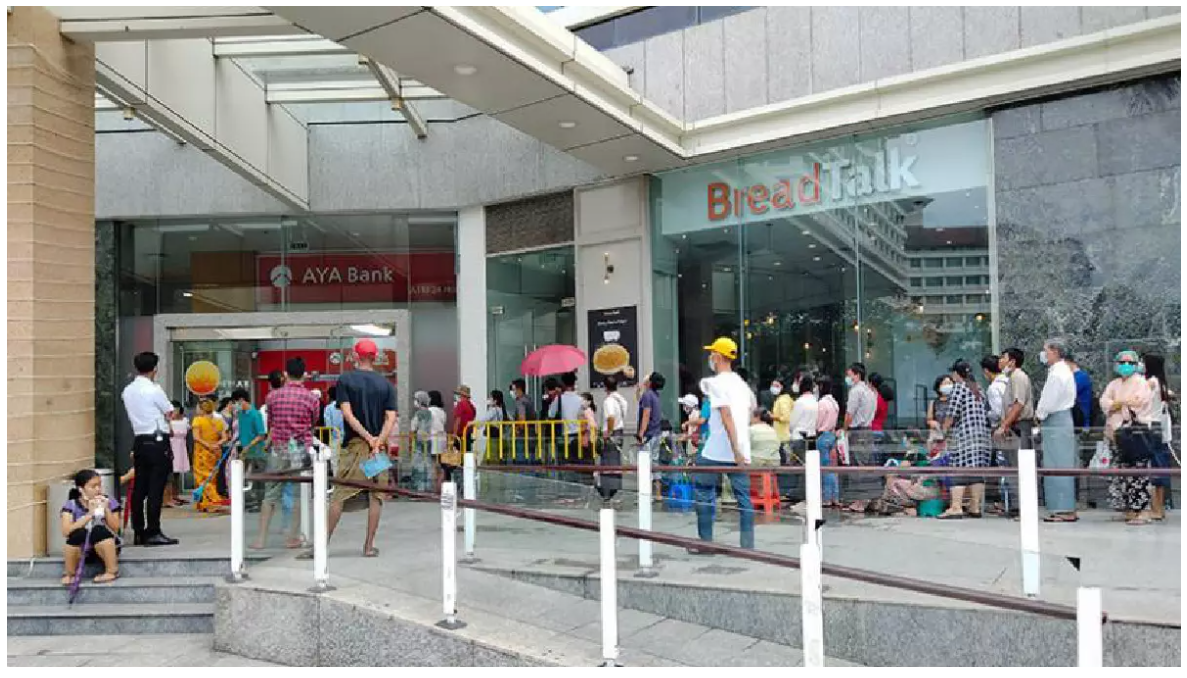Continued cash shortages pose dim prospects for banks in Myanmar
MYANMAR: Currently, difficulty withdrawing cash from banks, withdrawing cash by paying a certain percentage to brokers, and cash shortages are a tremendous challenge to Myanmar.
Until now, we have had problems with withdrawing cash from banks. The Central Bank also issued restrictions such as a withdrawal of Ks 20 million only for companies and Ks 2 million only for individuals and allowing more cash withdrawals for Covid-19 medicine and equipment. But, banks are facing cash shortages. So they can’t even pay the amount the Central Bank has set. Both private and government banks are the same now. We are still facing cash shortages,” said a local businessman, Dr Soe Tun.
Even before the current situation, a majority of banks in Myanmar have already been facing problems such as non-performing loans, disbursement of loans more than a set amount ,and seeking of loans in excessive amounts, according to the community of bankers.
Normally, banks runs by receiving deposits and giving loans. Due to current challenges, the banks are losing public credibility. Particularly, difficulty withdrawing cash has made the public lose their trust in banks.
“If we can’t withdraw our money, loss of our trust will be the problem for those banks. We can’t pay or receive cash between accounts. With the use of cash-only methods, the economic mechanism can run only with the cash the country has in hand. I don’t know much about accounts. Suppose I have a 10% amount of total cash on hand, my business has to rely on that amount. The remaining 90% is seated in the bank. If that’s so, our economy will be stagnant,” Dr Soe Tun said.
As of mid-July, the Myanmar kyat had depreciated by around 23 percent against the US dollar compared to late January, which combined with trade disruptions has led to rapid price increases for some imported products, including fuel, according to the World Bank report.
With depreciation of Myanmar kyat, trade and logistical restrictions and other external reasons,prices of imported goods have increased significantly. Fuel prices have jumped up to nearly 50%.
Despite bank branch re-openings and several interventions from the Central Bank of Myanmar, physical currency continues to be in short supply and access to banking and payment services remains limited.
Due to inconveniences in banking services, most of the public members have to pay a certain percentage (5% or 6%) when they withdraw cash from their own bank accounts.
Rumors surfaced recently that three local banks would go into liquidation amid difficulties with cash withdrawals from both banks and ATMs. The Central Bank dismissed the rumors about bank closures and demonetization of 5,000-kyat notes and 10,000-kyat notes. It said it had instructed the banks to operate their regular services.
In its statement issued on August 13, the Central Bank said such rumours triggered public concern and large crowds at the banks withdrawing their money. It urged the people not to be worried about banking services and their money, assuring that the banks could be trusted.
“The closure of three banks is just a rumour. It was designed to disrupt the stability of state economy, the bank rules and regulations.
Currently, the Central Bank will not take any action against any bank. We have no plan to close any bank,” said U Win Thaw, vice governor of the Central Bank of Myanmar.
The statement also pointed out that the Central Banks is placing emphasis on monetary stability in the country, while the local banks are providing services in accord with the strong rules and regulations.
“They are just issuing statements. But it is not enough because the banks cannot pay Ks20 million as they have promised. Cash cannot be paid even for government projects, tenders and construction projects. We have to solve our problems by ourselves. It’s a great problem for foreign companies. A lot of them have stopped operation, said a businessman in Yangon city.
“Myanmar citizens still can try to withdraw their cash in various ways by paying a percentage or another. For foreigners, however, it doesn’t work. Some are public companies or corporations. Paying a percentage to access cash is not OK. They have to wait and see. Consequently, most have stopped their operation. It is only in Myanmar where we have to pay a 6% to 8% percent to withdraw cash from our own bank accounts. The world will have never heard of it,” the businessman continued.
If the situation goes on like this in the banking and monetary sector, coupled with the current political turmoil and Covid-19 impacts, local SMEs will find it harder to survive. Meanwhile, some have closed down, some businesspeople said.
Dr Soe Tun pointed out that unlike other countries, Myanmar’s economy was being affected by several issues, not just a single one.
“Most people want to withdraw their money. The Central Bank suggested opening new bank accounts. We also did it,” said another businessman. “The amount of money they got is said to be about 2 trillion kyats. We want to urge the banks to seek ways to transfer money from the old accounts to new ones. Now, six months have passed. It’s better if we get a timeline.”
Some business persons commented that monetary system and banking system are built with public trust and credibility. The banking system and businesses will only be able to survive only if unnecessary controls and restrictions are to be eased. They added that it is necessary for policy makers in in Myanmar to adopt correct policies to remedy the economic downturn.
Published : August 24, 2021
By : Nilar/Eleven Media/ANN


 English
English




